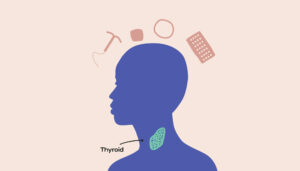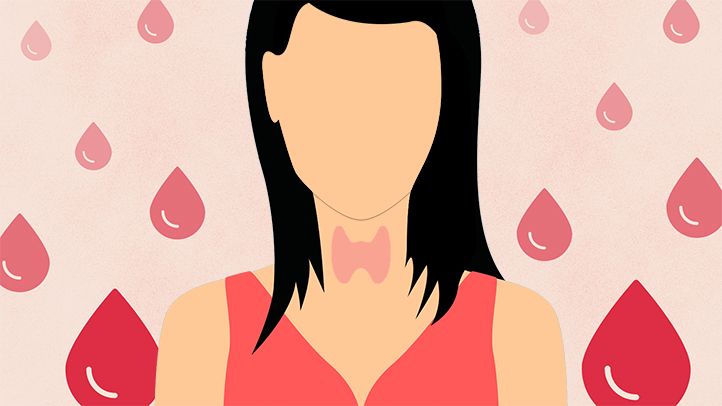Do you feel like your anxiety is out of control? Are you constantly worried about things that seem to be out of your control? If so, you’re not alone. Millions of people around the world struggle with anxiety on a daily basis. And for some people, this struggle can be made even worse by an underlying thyroid condition. In this blog post, we will discuss the relationship between thyroid and anxiety, and what you can do to get relief from both conditions!
Contents
Defining Anxiety
Anxiety is a normal emotion that we all feel at some point in our lives. It is often described as a feeling of fear, worry, or unease. Anxiety can be triggered by a variety of things, including stress, life transitions, and trauma. For some people, anxiety is a chronic condition that interferes with their daily lives.
Anxiety can turn into a disorder when it is so severe that it interferes with your ability to function in daily life. Anxiety disorders are the most common mental health disorder, affecting 40 million adults (that’s 18% of the population!). There are many different types of anxiety disorders, including generalized anxiety disorder, panic disorder, social anxiety disorder, and phobias.
Defining Thyroid
Thyroid is a butterfly-shaped gland that is located in the front of your neck. This gland produces hormones that are responsible for regulating your metabolism. When your thyroid is not functioning properly, it can lead to a variety of symptoms, including weight gain or loss, fatigue, anxiety, and depression.
Thyroid is also one of the most common endocrine disorders. The most common type of thyroid disorder is hypothyroidism, which occurs when your thyroid gland doesn’t produce enough hormones. This can be caused by a variety of things, including autoimmune disease, certain medications, and radiation therapy.
The Relationship Between Thyroid and Anxiety

There is a strong relationship between thyroid and anxiety.
- People with an underactive thyroid (hypothyroidism) are more likely to experience anxiety than those with a healthy thyroid.
- In addition, people with an overactive thyroid (hyperthyroidism) are also at increased risk for developing anxiety. The exact reasons for this link are not fully understood, but it is thought that the hormonal changes associated with these thyroid conditions can contribute to anxiety symptoms.
- The hormonal imbalances caused by a thyroid disorder can also lead to anxiety. This is because the hormones produced by the thyroid gland play a role in regulating mood. When there is an imbalance of these hormones, it can lead to feelings of anxiety and depression.
- The physical symptoms of both thyroid and anxiety can be extremely overwhelming and can trigger one another. For example, if you are feeling fatigued from your thyroid disorder, it can lead to anxiety about not being able to function properly. Or if you are struggling with weight gain from your thyroid disorder, you may become anxious about your appearance.
- Some research suggests that there may be a genetic link between the two conditions. This stems from the fact that anxiety and thyroid disorders often run in families.
- In fact, studies have found that up to 60% of people with anxiety also have an underlying thyroid condition.
- Finally, if your thyroid conditions are severe, the psychological stress of dealing with a chronic illness can also contribute to anxiety.
Living with both anxiety and thyroid disease can be difficult, but there are treatments available that can help you manage both conditions.
Signs And Symptoms

There are a variety of signs and symptoms that can indicate you have both anxiety and thyroid disease.
Common signs and symptoms of anxiety include:
- feeling nervous, restless, or tense
- having a sense of impending danger, panic, or doom
- having an increased heart rate
- sweating
- trembling or shaking
- feeling short of breath
- feeling like you can’t catch your breath
- nausea and dizziness
Common signs and symptoms of thyroid disease include:
- fatigue
- weight gain or loss
- dry skin
- hair loss
- cold intolerance
- constipation
If you are experiencing both these conditions at the same time, it can be difficult to determine which symptoms are coming from anxiety and which ones are from your thyroid disorder. It’s important to see a doctor if you think you might have both anxiety and thyroid disease.
Effects On Life
Anxiety and thyroid disease can both have a significant impact on your life.
- If you have anxiety, you may be afraid to leave your house or meet new people. You may also avoid situations that make you feel anxious. This can lead to social isolation and make it difficult to go to work or school.
- Thyroid disease can cause weight gain or loss, hair loss, and mood changes. It can also make it difficult to concentrate and remember things.
- Thyroid disease can also cause fatigue, which can make it hard to concentrate at work or school. It can also cause weight gain or loss, which can affect your self-esteem and body image.
- The physical symptoms of both conditions can also be very disruptive. For example, if you have an overactive thyroid, you may experience tremors, which can make it difficult to eat or drink without spilling. Or if you have an underactive thyroid, you may experience hair loss, which can be very distressing.
- Both anxiety and thyroid disease can also cause sleep problems. This can lead to further fatigue and make it even harder to concentrate during the day.
If you have both anxiety and thyroid disease, you may find that your symptoms are worse than if you had one condition alone. This is because the two conditions can interact with each other and make each other worse.
Diagnosis
If you think you may have a thyroid disorder, it is important to see your doctor for a proper diagnosis. The most common diagnostic tests include:
- Blood tests: These tests measure the levels of thyroid hormones in your blood.
- Imaging tests: An ultrasound or CT scan can be used to get a more detailed view of your thyroid gland.
- Thyroid biopsy: In this procedure, a small sample of tissue is taken from your thyroid gland and examined for abnormalities.
Once your doctor has confirmed that you have a thyroid disorder, they will work with you to develop a treatment plan. This may include medication, dietary changes, and lifestyle modifications.
Similarly, for an anxiety disorder diagnosis, your doctor will likely do a physical exam and ask you questions about your symptoms. They may also recommend that you see a mental health professional for a psychological evaluation. This evaluation can use various tools and tests such as:
- Diagnostic and Statistical Manual of Mental Disorders (DSM): This manual is used by mental health professionals to diagnose anxiety disorders.
- Anxiety Disorder Interview Schedule for DSM-IV: This interview can be used to help diagnose anxiety disorders.
- Hamilton Anxiety Rating Scale: This scale measures the severity of anxiety symptoms.
A mental health professional can further help you determine if your anxiety is due to a thyroid disorder or another underlying condition. They can also provide you with coping and treatment strategies for dealing with both conditions.
Treatment Options

If you have anxiety and thyroid disease, it is important to work with your doctor to develop a treatment plan that is right for you. There are a variety of treatment options available for both conditions, and the most effective plan will likely involve a combination of treatments. With the right treatment, you can manage both conditions and improve your quality of life.
For Thyroid
Thyroid can be managed through medication, dietary changes, and lifestyle modifications.
- Medication: For thyroid disorders, medications include:
Thyroid hormone replacement therapy: This treatment is used to replace the missing thyroid hormones.
-Anti-thyroid medications: These drugs help to control an overactive thyroid.
-Radioactive iodine therapy: This treatment helps to shrink an overactive thyroid
-Thyroid hormone replacement therapy: This treatment is used to replace the missing thyroid hormones.
-Calcium channel blockers: These drugs are used to treat hyperthyroidism-related heart problems.
- Dietary changes: For thyroid disorders, dietary changes include:
-Eating a healthy diet: This includes eating plenty of fruits, vegetables, and whole grains.
-Eating iodine-rich foods: This can help to improve the function of your thyroid gland.
-Avoiding goitrogens: These are substances that can interfere with the function of your thyroid gland.
- Lifestyle modifications: For thyroid disorders, lifestyle modifications include:
-Managing stress: Stress can worsen the symptoms of both anxiety and thyroid disorders.
-Getting enough sleep: Sleep can help reduce stress levels and improve your overall health.
-Exercising regularly: Exercise can help to improve mood and reduce stress.
For Anxiety
There are a variety of treatment options available for anxiety, including medication, therapy, and self-care strategies.
- Medication: Medication can be used to treat both anxiety and thyroid disorders. For anxiety, medications include:
-Selective serotonin reuptake inhibitors (SSRIs)
-Serotonin and norepinephrine reuptake inhibitors (SNRIs)
-Benzodiazepines
It is important to keep in contact with your healthcare provider to monitor the side effects as well as benefits of the medication on body.
- Therapy: Therapy can be an effective treatment for anxiety.
-Psychotherapy: This type of therapy can help you understand and work through your anxiety.
-Cognitive-behavioral therapy (CBT) is a type of therapy that can help you identify and change negative thinking patterns that contribute to your anxiety. Other types of therapy can include:
-Exposure therapy: This type of therapy involves gradually exposing yourself to the things that trigger your anxiety.
-Dialectical behavioral therapy (DBT): This type of therapy focuses on helping you manage your emotions and develop healthy coping skills.
- Self-Care Strategies: There are also several self-care strategies that can help you manage both conditions. These include:
- Getting regular exercise
- Eating a healthy diet
- Reducing stress
- Journaling
- Ensuring sufficient hydration
- Getting adequate sleep
- Avoiding alcohol and drugs
If you have anxiety and thyroid disease, it is important to work with your doctor to develop a treatment plan that is right for you. There are a variety of treatment options available for both conditions, and the most effective plan will likely involve a combination of treatments. With the right treatment, you can manage both conditions and improve your quality of life.
Conclusion
In conclusion, thyroid and anxiety can be related. If you have anxiety and thyroid disease, it is important to work with your doctor to develop a treatment plan that is right for you. There are a variety of treatment options available for both conditions, and the most effective plan will likely involve a combination of treatments. With the right treatment, you can manage both conditions and improve your quality of life.
For more information, please contact MantraCare. Anxiety is a common mental health condition characterized by persistent feelings of worry, fear, and apprehension. If you have any queries regarding Online Anxiety Counseling experienced therapists at MantraCare can help: Book a trial Anxiety therapy session


